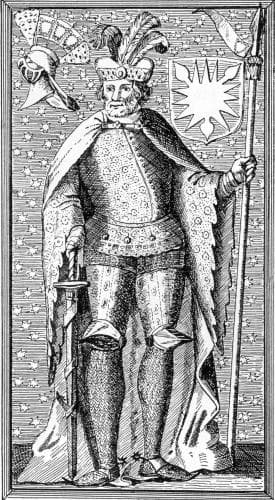
Blessed Adolf Iv Of Schauenburg
Blessed
Feast Day: July 8
Death: July 8, 1261
Biography
Blessed Adolf IV of Schauenburg, also known as Blessed Adolf IV of Holstein, was born into the noble lineage of the Count of Schauenburg in Germany. His exact birth date is not known, but it is believed that he was born in the early 13th century.
Adolf IV is primarily remembered for his military achievements and his significant contributions to the spread and development of Christianity in the region. In 1225, he earned great renown by successfully driving out pagan Danish invaders from the Holstein region of modern Germany. This victory established his reputation as a skilled military leader and defender of the faith.
Inspired by his faith and the example of his ancestors who had actively participated in the Crusades, Adolf IV embarked on his own crusade to Livonia (present-day Estonia and Latvia) in 1228. This region was known for its pagan tribes, and Adolf IV joined the military efforts to convert the local population to Christianity. His participation in the Livonian Crusade reflected his unwavering commitment to the cause of spreading the Gospel and defending Christian lands.
After returning from his crusade, Adolf IV dedicated himself to the promotion of religious life and the establishment of monastic communities in his homeland. He founded monasteries in both Hamburg and Kiel, cities in Germany that would become significant centers of religious and cultural activity. These monastic communities fostered education, spiritual growth, and acts of charity, reflecting Adolf IV's desire to cultivate a strong Christian presence in these regions.
Yearning for a deeper personal commitment to God, Adolf IV decided to enter the religious life himself. In 1239, he joined the Franciscan Order in Hamburg, embracing a life of poverty, humility, and devotion to God. Seven years later, in 1245, he was ordained a priest, and his ministry focused on serving the people of God and spreading the teachings of the Catholic Church.
Blessed Adolf IV of Schauenburg lived a life dedicated to holiness, prayer, and service to others. He was known for his piety, humility, and compassion towards the poor and marginalized. Despite his noble origins, he embraced a life of simplicity and advocated for the rights and well-being of those less fortunate.
On July 8, 1261, Blessed Adolf IV passed away in Kiel, Germany, due to natural causes. He was laid to rest in the church of the Franciscan abbey in Kiel, a fitting place for his eternal rest as a member of the Franciscan Order. While his exact date of birth is unknown, his feast day is celebrated on July 8th, the day of his death, as a tribute to his exemplary life and devotion to God.
Blessed Adolf IV of Schauenburg is remembered as a courageous military leader, a dedicated promoter of monastic life, and a faithful servant of God. His life serves as an inspiration to all those seeking to live out their faith with conviction and compassion. Though he has not been officially canonized as a saint, his memory is cherished by those who honor and venerate his sacred life.